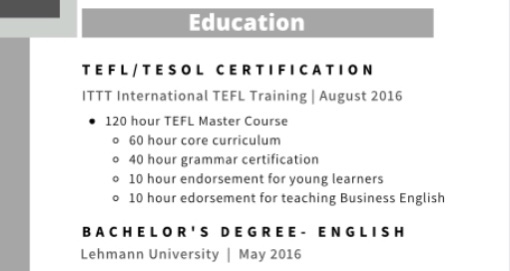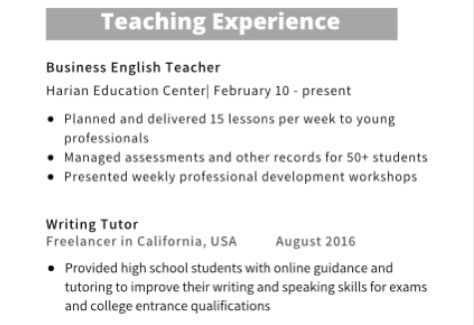All you need to know on how to create the perfect international CV/Resume to teach English online or abroad.
With the demand for English educators online and abroad rising, more and more people are deciding to take the leap to pursue to be an English teacher abroad.
And if you find yourself one of them you will, without a doubt, need a killer International CV/Resume to snag yourself the perfect English teaching job.
Surprisingly, the average recruiter will only spend 30 seconds reading a CV before they decide to interview.
And nowadays, many Resume/CVs are machine read by an automated system. These systems take out the important information automatically and will sort pass/fail CVs based on that information.
So, needless to say, if you want to get ahead of the game you got to, above all else, make your application stand out. In this article I outlined all that you need to know to do just that.
Write Your Resume for the Job you want—Not the Job you already have
It is important to write a resume that specifically highlights your experience in connection to the job you are applying for.
Personally, I have many different resumes. One highlights my restaurant, tourism, and business management experience. Another for my digital nomad experience, such as online teaching, blogging, and content writing. The last specifically for the education sector.
But before you dive into hammering out all your details I want you to keep two things in mind:
What are my protentional employer’s problems/needs?
How can I personally fulfill them?
What are recruiters looking for?
- Native Speaker (usually)
- 120 hour TEFL certificate
- Bachelor’s degree or equivalent (usually)
- Experience
Online English Teaching Applicant Essentials
- International CV/Resume
- Photo
- Strong and Reliable Internet Access
- Link to introduction video
- Relevant teaching experience
There are many worlds inside of the English language. Medical, business, technical, mechanical, marketing, culture. The lists go on and on.
So, if you are applying for a job to teach English at a car manufacturing company, then you need to detail all of your experience in that field, such as, your familiarity with technical and mechanical vocabulary, and general vehicle knowledge.
If you are applying for a job to teach children, they need to know that you know how to talk and entertain little kids! You don’t need to be an expert; general knowledge is better than no knowledge at all. And remember, we are trying to put you above all the rest
Format for your International CV/Resume
As in all formal writing, your resume should be clear, brief, and accurate.
- Put your TEFL or TESOL certification towards the top of the page. This is one of the first things that the recruiter will be looking for.
- Less is more. Obviously, if you are highly skilled and experienced you will have a lot more information to include than a novice teacher. But limit your resume as much as possible
- Use fonts that are business professional such as Ariel, Calibri, or Verdana. And don’t use more than two fonts.
- Stick to colors that are easy to read. I know this might be difficult for the creatives out there, but unconventional neon colors are more likely to be skimmed over, or completely bypassed versus a more neutral or monochrome color scheme.
- Proper use of headings and subheading. For example, heading should be bold, and subheadings should be italicized. And there should be plenty of white space in between sections to create a cleaner look.
- Proofread, proofread, proofread! After you proofread your resume, have a friend double check your work, use an app like Grammarly, or hire a freelancer on a site such as Fiver.
Structure for your International CV/Resume
The following is a generalized view of what the structure of you CV should look like:
- Letterhead: Basic Contact Info
- Job Title/Sector
- Education and Certification
- Experience
- Skills and Knowledge

However, it is important to note that you must adapt your CV to your own personal strengths.
If your strongest asset is your education and certification then that should be at the top of your CV with your least strong qualities arranged in the middle. Therefore, if your experience is stronger than your educational achievements then begin your CV with that information.
Basic Information/Letterhead
Your basic information should always be easily found, usually at the top or aligned along the side of your resume.

This includes your name, address, phone, email, and citizenship, and social handles that are relevant to your teaching or online experience.

For example, if you are applying to be an online teacher it would be best to include your Skype username or website if possible. In some instances, certain countries such as Germany will also ask for your gender, age, and marital status.
Also, you should have a professional looking headshot next to your letter head. Make sure the photo is well lit, with a white background, and that your image is framed from the top of your head down to the middle of your chest.
Education and Certification
Make sure to bold the qualification so that it’s easily visible to the recruiter. Put your TEFL / TESOL first as that is what they look for first.

Experience
The format should be as follows:
- Job title
- Name/location of employer
- Dates
- Brief description of responsibilities.
For teaching jobs, it’s good to list ages and levels of students, and numbers of students you have taught. For example, private one on one lessons, small groups of 5-10 students, or if you have managed classrooms of 20 students or more.

Don’t include experience that is not relevant to teaching. If you don’t have any experience list things like your teaching practices from your TEFL, volunteer work, childcare work, or anytime of management or trainer experience.
Skills/Knowledge
Do you know your way around the computer? Skills using programs such as Skype, Google Classroom, or Zoom are going to be a big advantage. Your employer is going to want to know that.
Also, whether you are learning a new language or fluent, you must include your proficiency level of these languages.
Best Ways to Learn a Language at Home
6 Tips for Learning a Foreign Language

But more importantly, INCLUDE YOUR KNOWLEDGE. You know a lot more than you think! And this includes your hobbies too. That’s right—you heard me. Dig deep, really think about what job that you are applying for and write down any area that might make you stand out.
For example, if you are applying as a Business teacher at a recreation company the state your knowledge of the outdoors and nature, and any activities that fall into the recreational field.
The format could look as the following:
Advanced Knowledge-
Intermediate Knowledge-
Basic Knowledge-
Technology
Needless to say, a good and reliable internet is essential to teaching English online. Some schools will want to know the type of internet connection that you have, and the speed. So, it is best to include this on your resume.
Equipment
- Laptop/desktop
- Headset
- Webcam (internal on your computer, or external)
- Internet speed
*All online teaching recruiters are going to have a minimal level of specifications of your computer, such as make, model, operating system and processing speed.
Introduction video
Not in all cases, but most teaching companies require a one-minute introduction video. This is one of the biggest differences between applying for online teaching jobs versus in-classroom positions.
However, regardless whether it is required, as a general rule for a killer resume…I would include one anyway. You can do this by shooting a one-minute video outlining a little about yourself, and why you would be perfect for the job, and why you would be perfect for the company.
Then upload the video onto YouTube, and attach the link with any other social handles that you include such as LinkedIn.
Next Steps
Now, that you have finished your killer International CV/Resume–it’s time to let the job search begin! There are many portals that you can use that are accessible at an international level , such as Indeed or Monster. But it is also recommended to do local researches for the specific country, and even narrowing down to the region or city as well.
If you know what region you would like to work in you should join social groups such as Facebook pages or job forums for that country.
For example, when I first moved to the Hanover region in Germany, I joined Hannover4EnglishSpeakers Facebook page.
And don’t forget when you are doing job searches you should also research in their target language. For example, when I was looking for an English teaching job in Germany, I searched for English Teacher jobs, and Englisch Lehrer/in jobs.
Good luck, and stay tuned for my next article detailing on how to get an English teaching job in Germany!
